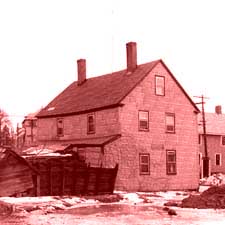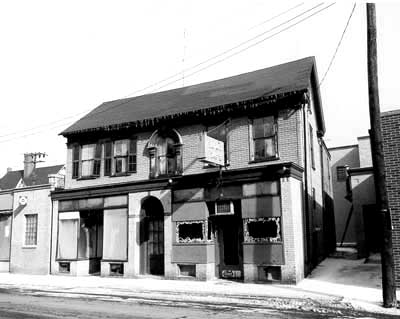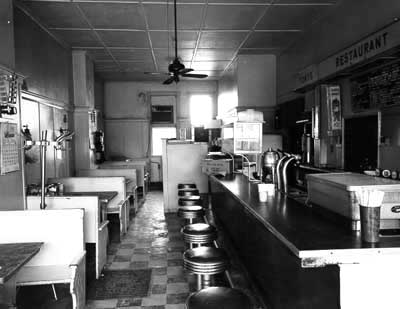|
FRESH STUFF DAILY |
|
|
||
|
|
||
|
|
||
|
SEE ALL SIGNED BOOKS by J. Dennis Robinson click here |
||
Page 1 of 2
In the early 1970s progress hit Portsmouth's North End like an H-bomb. Nearly 200 homes, 400 buildings in all, were bulldozed out of sight -- but not out of mind. The full story of how the city obliterated its own dilapidated "Little Italy" neighborhood and scores of historic buildings has yet to be fully told or understood. People are still touchy about the topic a half century later. Despite the eventual success of the Sheraton Hotel complex, the parking garage and a few surviving buildings on "The Hill," -- few critics dispute that the project was at first, a major failure economically, architecturally and culturally. But the details still lie scattered in library archives, file drawers and the all-too-vivid memories of the families who once lived in the Russell Street neighborhood that became a parking lot.
Certainly the founding motivation was practical enough. Times were tough all over. Portsmouth had survived over 300 years on an economic seesaw ride. Regarded as one of the most beautiful surviving colonial cities in America, Portsmouth in the mid-20th century still teetered on shaky fiscal legs. Market Square was not yet renovated. The current gentrification, increased tourism and cultural awakening were just about to begin. The Port City still had a rough and tumble reputation. The Worcestor Sunday Telegram described Portsmouth in 1969 as an "impoverished aristocrat of a city." Urban renewal, a federally funded program, promised millions of dollars, practically for free, to economically ailing cities. If the Portsmouth Housing Authority (PHA) could target precise problem areas, the federal government would provide two dollars for every city dollar spent to eradicate the "spreading blight." Impoverished areas, the theory went, were sucking the life force out of America's cities and blocking commercial development. Studies indicated that the blight in Portsmouth was located largely in residential areas near the city center. These low-rent districts were considered "unhealthy" and unattractive, and brought in little tax revenue. If the buildings were declared substandard, they could be taken by eminent domain and removed to make way for progress. These neighborhoods, according to urban renewal policy, could be upgraded, salvaged through a costly process of rehabilitation, or they could be removed, like a cancer, with the flick of a bulldozer blade. PHA New construction could then bring prosperity. In the blighted "Puddle Dock" area near the waterfront, urban renewal had already been tempered by preservationists who salvaged many stately homes to create a "colonial village" known as Strawbery Banke Museum. But the North End was closer to the city center. Originally settled in colonial times, it had become an "ethnic" waterfront neighborhood. Poor Irish immigrants who occupied the area moved "up the crick" to the "Christian Shore" neighborhood nearby when a wave of Italian immigrants arrived in the early 1900s. Within two decades the Italian arrivals, bringing customs unfamiliar to Portsmouth and speaking a foreign tongue, comprised up to 95 percent of the population in the tiny replica of Boston's North End.
Life in the North End The tightly held ethnic neighborhood became a world unto itself, with its own grocery stores, social clubs, restaurants and shops. Italian-American children attended the Farragut school in the North End, played games in their own streets and swam near the railroad bridge in the North Mill Pond. Women ran the households and raised children. Men worked in the local shoe and button factories or as casual laborers, later as masons or shipyard workers. Former residents who grew up in "Little Italy" still speak of it in idealized terms. At a North End reunion videotaped in 1986, Delfo Cominati born in the North End in 1911 said, "We were all very poor, but we had a great life." Mary Succi Ciotti remembered vendors delivering ice and live chickens to her home, and learning to dance the jitterbug in the streets. "Mundo" Zoffoli said "We were all happy people" but, he added, "when urban renewal came through and took our houses, they put us all in debt, because they didn't pay us enough for our houses." Despite the easy-going nostalgia, this undercurrent of sadness and anger still runs just beneath the surface for a neighborhood vaporized by federal and local decree. In the "Russell Street Reunion" video Delmira Pirini Allan said, "We question why they took the North End -- especially when it was supposed to be for a certain purpose " Then Portsmouth Library Director Sherman Pridham, in a newspaper article following the 1986 reunion, added that his grandmother was relocated from her North End home to an elderly housing facility and died within a year. Newspaper clippings on file at the Portsmouth Public Library show the media at the time emphasizing the projected tax gain, modernization and economic benefits of urban renewal. Local feature articles focused on the plight of the displaced population are not evident from the library files. In the articles collected, there appears to be no references to the site as an Italian neighborhood with nearly 70 years of history. CONTINUE THIS STORY & SEE MORE PHOTOS
Please visit these SeacoastNH.com ad partners.
News about Portsmouth from Fosters.com |
| Friday, April 26, 2024 |


|
Copyright ® 1996-2020 SeacoastNH.com. All rights reserved. Privacy Statement
Site maintained by ad-cetera graphics

 Smuttynose Murders
Smuttynose Murders



 Clearcutting a Community
Clearcutting a Community

















